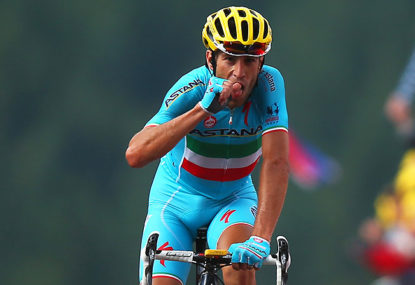'I've just won a stage of the Tour de France, mate!': Hindley grabs yellow jersey as Aussie blows Tour apart
Australia's Jai Hindley has said he is "lost for words" after a shock stage victory at the Tour de France earned him the leader's…

There is no sport that needs to work harder on its reputation than road cycling.
With all the trials and tribulations over recent years culminating with Lance Armstrong being stripped of his seven Tour de France titles, the image of the sport must be paramount in its decision making.
In that context, Astana, one of the most high profile professional teams boasting 2014 Tour de France champion Vincenzo Nibali, had their license renewed by the International Cycling Union.
Pragmatism trumped the opportunity to make a statement.
It’s easy to say it’s disappointing, because it is. Equally, there is no doubt the ICU president Brian Cookson, who campaigned for a new era of governance in the sport, will be criticised. It may, however, be the only realistic decision open to the ICU.
To set the scene, the licence being the subject of debate was due to a spate of failed drug tests.
Maxim Iglinskiy failed a test for EPO and his brother Valentin did likewise. Three members of the Continental team, or development team, transgressed using anabolic steroids, including trainee professional Ilya Davidenok.
It does not help the team’s cause that Astana’s manager is Alexander Vinokourov, the Kazakhstan rider who tested positive in 2007 leading to the Astana Team withdrawing from the Tour de France. He was suspended for two years and appears unrepentant.
Italian newspaper La Gazzetta printed allegations that disgraced doctor Michele Ferrari, who supplied prohibited substances to riders including Lance Armstrong and Vinokourov and was given a lifetime ban from the sport, was seen at an Astana training camp in 2013. An allegation which he denied.
In the face of that evidence, it may be asked why the ICU took the view a licence should be renewed, albeit with conditions.
It has to be considered, however, that there was a lack of evidence to establish that the transgressions were team-based or orchestrated, as well as Ferrari’s involvement.
Vinokourov’s history was deemed irrelevant, the Continental team considered a separate legal entity, and Maxim Inglinskiy’s influence over his brother meant their positive tests counted as one transgression only.
There was also a precedent of individual riders from other teams testing positive to banned substances and, most importantly, had the license been denied there would have been a costly and likely successful challenge to the Court of Arbitration for Sport.
On that basis the ICU determined the better course of action was to allow the licence, but with conditions – in effect placing Astana on probation.
Those conditions include Astana’s affairs being audited by the Institute of Sports Science of the University of Lausanne. This includes a review of the degree to which Astana’s management ought to have been aware and to have taken some action and will look at the issue of the team’s culture.
Astana will have to adhere to the “professional team’s internal operational requirements”, something you’d think they would already have been subject to.
The tragedy is the lost opportunity to assure the cycling public that the sport is clean and the public can have confidence in it. Perhaps the fact that Astana may succeed on appeal ought to have been a secondary consideration.
The episode demonstrates cyclists are still willing to cheat. Presumably because riders continue to believe they will avoid detection. While these five transgressions were exposed, it does not alter the suspicion that many others remain undetected.
The fact that Nibali won this year’s Tour de France must cast a question mark over the event. That is not to say Nabali cheated, but uncertainty continues to taint the sport.
What does that all this mean for the Australian public’s perception of our Orica-GreenEDGE team, the team we love to support and believe in? Its creed is to take a hardline stance against doping, and it has been relatively free from controversy to date.
Daryl Impey tested positive for a masking agent in 2014 but was cleared of any wrongdoing.
Sports director Matt White admitted to doping violations during his career and that appointment is a significant weakness. Others will disagree, but for many the tolerance of those who have cheated in the past is unacceptable. The argument of it being a different era and outlook are not persuasive.
The conclusions are that the ICU acted in a practical manner and that we will continue to follow the sport but with a healthy does of skepticism. GreenEDGE will also have the benefit of the doubt and retain the confidence of the Australian public, despite their zero tolerance stance and employment of a doping cheat being incompatible.